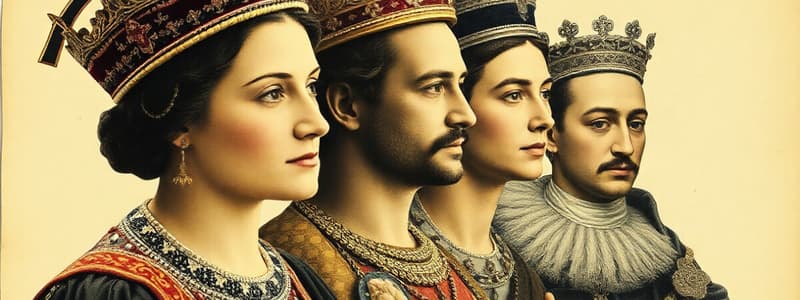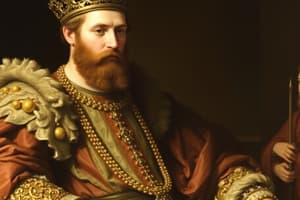Podcast
Questions and Answers
Match the following terms with their definitions:
Match the following terms with their definitions:
Triangle Trade = A colonial trade system where European merchants traveled and traded on the Indian Ocean. Middle Passage = The transport of enslaved Africans across the Atlantic Ocean to the Americas. Columbian Exchange = The exchange of goods, foods, and diseases between the Old World (Afro-Eurasia) and the New World (Americas) after 1492. Diaspora = People who live away from their homeland. Ex: The African Diaspora includes all peoples of African descent who live outside of Africa.
Match the terms from the first column to the correct categories from the second column:
Match the terms from the first column to the correct categories from the second column:
Renaissance = Colonization Absolute Monarchy = European Trade Routes Spanish Inquisition = Religious Innovations in Europe French Revolution = Colonial Empires Conquistador = Colonial Empires Columbian Exchange = Colonial Empires Triangle Trade = European Trade Routes Middle Passage = Colonial Empires Joint-Stock Company = European Trade Routes Mita System = Colonial Empires Chattel Slavery = Colonial Empires Indentured Servants = Colonial Empires
Match each term to its correct definition:
Match each term to its correct definition:
Hegemony = Control or influence over a region Trading Post = A city used for trade along maritime routes Joint-Stock Company = Privately funded merchant company with minimal risk Mercantilism = Economic theory focused on maximizing trade Candomble = Afro-Brazilian religious tradition blending African and Christian elements
Match the historical figures with their descriptions:
Match the historical figures with their descriptions:
Match the labor systems with their descriptions:
Match the labor systems with their descriptions:
Match the terms related to crops with their characteristics:
Match the terms related to crops with their characteristics:
Match the types of rulers with their governing styles:
Match the types of rulers with their governing styles:
Match the following historical events with their impacts:
Match the following historical events with their impacts:
Match the following terms with their respective regions:
Match the following terms with their respective regions:
Match the following terms with their associated practices:
Match the following terms with their associated practices:
Match the following historical figures with their respective roles or actions:
Match the following historical figures with their respective roles or actions:
Match the following methods of European colonial control with their descriptions:
Match the following methods of European colonial control with their descriptions:
Match the following colonial powers with their primary area of influence:
Match the following colonial powers with their primary area of influence:
Match the following events with their significance:
Match the following events with their significance:
Match the following diseases with their effects on Indigenous populations:
Match the following diseases with their effects on Indigenous populations:
Match the following groups with their roles in the colonial economy:
Match the following groups with their roles in the colonial economy:
Match the following colonial outcomes with their descriptions:
Match the following colonial outcomes with their descriptions:
Match the following explorers with their main discoveries:
Match the following explorers with their main discoveries:
Match the following colonial practices with their characteristics:
Match the following colonial practices with their characteristics:
Match the following historical events with their respective centuries:
Match the following historical events with their respective centuries:
Match the following regions with their colonial systems:
Match the following regions with their colonial systems:
Match the following significant figures with their contributions:
Match the following significant figures with their contributions:
Match the social groups with their descriptions:
Match the social groups with their descriptions:
Match the economic terms with their definitions:
Match the economic terms with their definitions:
Match the explorers with their roles:
Match the explorers with their roles:
Match the events with their historical contexts:
Match the events with their historical contexts:
Match the historical figures with their impacts:
Match the historical figures with their impacts:
Match the terms with their meanings:
Match the terms with their meanings:
Match the colonial practices with their results:
Match the colonial practices with their results:
Match the terms with the correct characteristics:
Match the terms with the correct characteristics:
Match the events with their significance:
Match the events with their significance:
Match the motives for exploration with examples:
Match the motives for exploration with examples:
Match the colonial powers with their colonies:
Match the colonial powers with their colonies:
Match the terms with their definitions:
Match the terms with their definitions:
Match the economic systems with their descriptions:
Match the economic systems with their descriptions:
Match the types of labor with their characteristics:
Match the types of labor with their characteristics:
Match the colonial terminology with their entire descriptions:
Match the colonial terminology with their entire descriptions:
Match the cultural terms with their definitions:
Match the cultural terms with their definitions:
Match the monarchical systems with their definitions:
Match the monarchical systems with their definitions:
Match the agricultural terms with their explanations:
Match the agricultural terms with their explanations:
Match the trade concepts with their descriptions:
Match the trade concepts with their descriptions:
Match the revolutions with their defining features:
Match the revolutions with their defining features:
Match the colonial occupations with their definitions:
Match the colonial occupations with their definitions:
Match the exploitative practices with their characteristics:
Match the exploitative practices with their characteristics:
Match the historical terms with their occurrences:
Match the historical terms with their occurrences:
Match the religious travels with their definitions:
Match the religious travels with their definitions:
Match the geographic and economic terms with their descriptions:
Match the geographic and economic terms with their descriptions:
Flashcards
Renaissance
Renaissance
A period of major cultural revival in Europe, starting in the 14th century, marked by renewed interest in classical learning and art.
Absolute Monarchy
Absolute Monarchy
A monarchy where the ruler has absolute power, not bound by any laws or a parliament.
Constitutional Monarchy
Constitutional Monarchy
A monarchy where the ruler's power is limited by a constitution and shared with a parliament.
Encomienda System
Encomienda System
Signup and view all the flashcards
Mita System
Mita System
Signup and view all the flashcards
Cash Crops
Cash Crops
Signup and view all the flashcards
Indentured Servants
Indentured Servants
Signup and view all the flashcards
Chattel Slavery
Chattel Slavery
Signup and view all the flashcards
Triangle Trade
Triangle Trade
Signup and view all the flashcards
Middle Passage
Middle Passage
Signup and view all the flashcards
Columbian Exchange
Columbian Exchange
Signup and view all the flashcards
Peninsulares
Peninsulares
Signup and view all the flashcards
Criollos
Criollos
Signup and view all the flashcards
Mestizos
Mestizos
Signup and view all the flashcards
Mulattos
Mulattos
Signup and view all the flashcards
Candomble
Candomble
Signup and view all the flashcards
Joint-Stock Company
Joint-Stock Company
Signup and view all the flashcards
Hegemony
Hegemony
Signup and view all the flashcards
King Louis XIV
King Louis XIV
Signup and view all the flashcards
Spanish Inquisition
Spanish Inquisition
Signup and view all the flashcards
Reformation
Reformation
Signup and view all the flashcards
Missionaries
Missionaries
Signup and view all the flashcards
Conquistadors
Conquistadors
Signup and view all the flashcards
The Spanish Inquisition
The Spanish Inquisition
Signup and view all the flashcards
King Ferdinand and Queen Isabella
King Ferdinand and Queen Isabella
Signup and view all the flashcards
Versailles
Versailles
Signup and view all the flashcards
Viceroy
Viceroy
Signup and view all the flashcards
Criollos (Creoles)
Criollos (Creoles)
Signup and view all the flashcards
Trading Post
Trading Post
Signup and view all the flashcards
Mercantilism
Mercantilism
Signup and view all the flashcards
Ottoman Conquest of Constantinople
Ottoman Conquest of Constantinople
Signup and view all the flashcards
European Colonization of the Americas
European Colonization of the Americas
Signup and view all the flashcards
Spanish Colonial Administration
Spanish Colonial Administration
Signup and view all the flashcards
Maroon Resistance
Maroon Resistance
Signup and view all the flashcards
Treaty with Maroons
Treaty with Maroons
Signup and view all the flashcards
Trading-Post Empires
Trading-Post Empires
Signup and view all the flashcards
Study Notes
Renaissance
- A period of cultural rebirth in Europe (1300s-1600s)
- Meaning "rebirth" or "re-awakening"
Absolute Monarchy
- A monarchy with unlimited power and not restricted by laws
- Examples: France, Spain, Russia, Portugal
Constitutional Monarchy
- A monarchy with limited power, bound by laws
- Shared power with a parliament
- Examples: Britain, The Netherlands
King Ferdinand and Queen Isabella
- Spanish monarchs
- Established the Spanish Inquisition
- Sponsored Christopher Columbus's voyages
King Louis XIV
- French absolute monarch ("Sun King")
- Built the Palace of Versailles
- Controlled the upper class (bourgeoisie) by attracting nobles to the palace
Spanish Inquisition
- A policy of the Spanish Catholic monarchs to punish non-Catholics
- 150,000 trials and 3,000 executions in the 1500s (of Jews, Muslims, and Protestants)
Reformation
- Religious movement starting in 1517 (Martin Luther)
- Protestant churches broke away from the Catholic Church
- Led to violence between Catholics and Protestants
Christopher Columbus
- Explorer who sought a westward route to India
- Landed in the Americas in 1492
- His voyages started European colonization of the Americas
Conquistador
- Spanish soldiers who participated in the conquest of the Americas
Colonization
- Establishing control and settlement in distant lands
- Part of building an empire
Colony
- Land controlled by a distant empire
- Settled by people from the controlling empire
Missionary
- Someone who travels to spread their religion (esp. Christianity, Islam, Buddhism)
Encomienda
- System granting Spanish conquistadors land and indigenous laborers
Mita System
- Forced labor system (from the Incan Empire) used by the Spanish
- Indigenous men worked in Spanish mines
Cash Crops
- High-yielding crops (sugar, rice, tobacco, indigo, cotton)
- Generated wealth for plantation owners
Indentured Servants
- People who sold their labor for passage to the New World (mostly in British colonies)
Chattel Slavery
- System where enslaved people are owned as property
- Often treated cruelly
Viceroy
- Governor of a colony, representing the absolute monarch
Triangle Trade
- Colonial trade system across the Atlantic
- Europe to Africa (manufactured goods):
- Africa to Americas (enslaved people):
- Americas to Europe (cash crops)
Middle Passage
- The voyage of enslaved Africans across the Atlantic to the Americas
Diaspora
- People living outside their homeland, e.g. African Diaspora (descendants of enslaved Africans)
Queen Nzinga
- Angolan leader who resisted Portuguese colonization
Columbian Exchange
- Exchange of goods, foods, and diseases between the Old and New Worlds (post-1492)
Peninsulares
- European colonists born in Spain, living in the Americas
Creoles (Criollos)
- People of European descent born in the colonies
Mestizos
- People of mixed European and Indigenous descent
Mulattos
- People of mixed European and African descent
Candomblé
- Afro-Brazilian religious tradition combining African and Christian elements
Trading Post
- City used for maritime trade, often controlled by a distant empire
Joint-Stock Company
- Privately funded company for trade (minimal risk, potential profit)
Hegemony
- Regional power
Mercantilism
- Economic theory emphasizing trade as wealth generation, government encouragement of trade
European Colonization: Causes
- Desire for new trade routes to Asia:
- Drive for wealth (spices, silk, gold, resources)
- European conquest and control of new lands
- Increase of wealth and power for European countries
European Colonization: Effects
- Indigenous population decline (diseases, harsh treatment)
- Forced labor systems (encomienda, mita)
- Cultural and social changes in the Americas
- Introduction of new goods and ideas
Colonial Systems: Similarities (Spain and Portugal)
- Reliance on forced labor (encomienda, African slavery)
- Resource extraction (sugar, gold, silver)
- Wealth generation from enslaved populations
Colonial Systems: Differences (France and England)
- Interactions with Indigenous peoples: alliances (France) vs. displacement (England)
- French trade with Native Americans (especially in fur trade)
- English focused on settlement
Colonialism and Resistance
- Colonialism lead to violence and resistance from enslaved people and descendants to escape oppression and maintain freedom
Studying That Suits You
Use AI to generate personalized quizzes and flashcards to suit your learning preferences.




